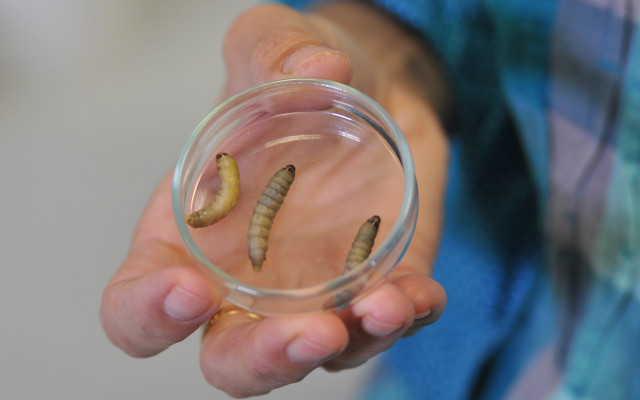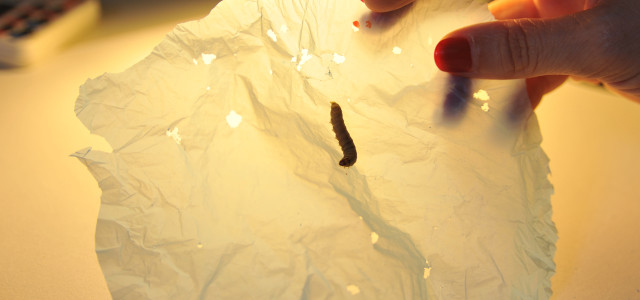A scientist at the Spanish research institute CSIC has identified a caterpillar that can eat and digest plastic. This discovery could be a breakthrough in the fight against plastic garbage.
The caterpillar of the greater wax moth typically feeds on honey and wax in beehives. Now it appears it can also eat polyethylene —and thus may be one solution for the organic consumption and breakdown of plastics.

Scientist Federica Bertocchini accidentally uncovered the caterpillar’s unique diet. Bertocchini is also a hobby beekeeper; she removed some foreign larva from her own beehive and tossed them into a plastic bag for disposal. Days later, she found everything covered with caterpillars. “They escaped from the plastic bag even though it was tied shut, and when I looked closer, I saw that the bag was full of holes. The only explanation was that the caterpillars had made the holes,” said Bertocchini.
Her observation was the beginning of scientific examination of the caterpillar.
Plastic-Eating Caterpillars: Why This Discovery Is So Important
Polyethylene (PE) is the most popular plastic worldwide. Every year, 80 million tons of PE are produced. PE is used for every kind of packaging, from plastic bags to plastic wrap to bottles and drink box liners.
Like most common plastics, PE is also produced from oil, is not biodegradable, and requires nearly 400 years to disintegrate entirely.
Well, that was the case until now; further research on the greater wax moth caterpillar could change the picture entirely. Scientists – from CSIC and Cambridge – have already patented their discovery.
“Plastic is a global problem. Today garbage can be found everywhere, even in rivers and oceans. Polyethylene especially is quite robust and very difficult to degrade naturally,” said Bertocchini, who actually works for the Institute for Biomedicine and Biotechnology at the University of Cantabria, Spain.
Speedier Biodegrading of Plastic
In numerous experiments, Bertocchini and her team of researchers tested how efficiently the caterpillars could biodegrade PE. The result: 100 wax moth caterpillars could digest 92 milligrams of PE in 12 hours. According to Bertocchini, this is an amazingly speedy biodegradation.
Researchers have found that the makeup of beeswax and PE are quite similar. They hypothesize that this is what makes it possible for these caterpillars to digest such substances. “We’re still not entirely clear how this biodegradation occurs, but we believe that an enzyme may be responsible,” said Bertocchini.
The scientists’ next step is to uncover this enzyme, isolate it, and attempt to produce greater amounts of it in the lab. In the best-case scenario, this could be the start of a new technology to successfully eliminate the plastic waste problem.
Utopia believes the discovery that everyday plastics could be naturally biodegradable is spectacular. But to place too much hope in this result at this point is foolhardy, as there are still a great number of unknown factors. That said, it’s still worth keeping an eye on this team’s future developments!
By Annika Flatley
This article was translated from German into English. You can view the original here: Forscherin entdeckt Plastik fressende Raupen
More from utopia.org:
- Take a Break: 5 Tips for a Healthier Lunch
- Less Plastic in 7 Easy Steps
- Groceries Stored Right: 7 Easy Tricks
Do you like this post?






